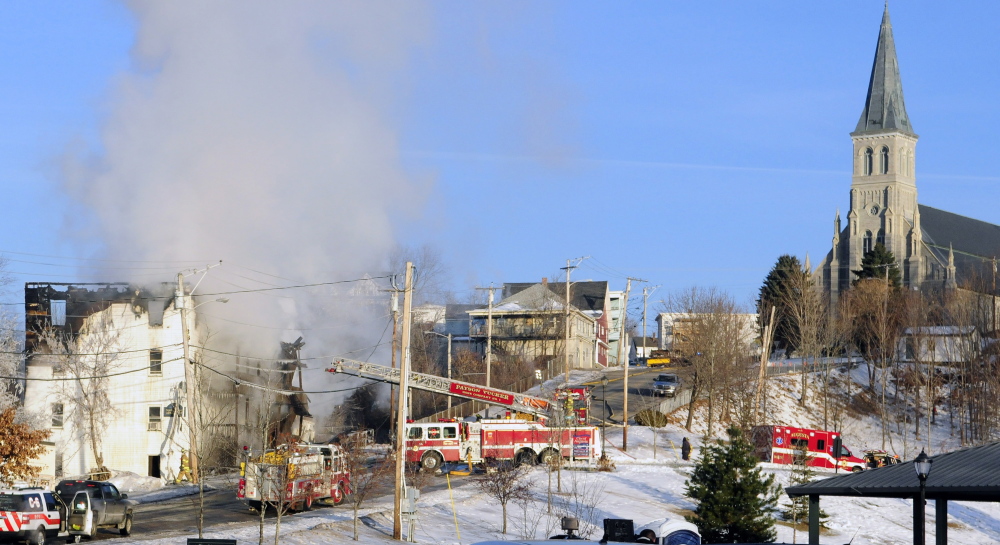AUGUSTA — Safety codes for apartment buildings aren’t just meant to be a costly, confusing hassle for landlords; they can save lives and prevent or limit pricey damage, authorities told about 25 local landlords and property managers at a forum on fire safety and codes for apartment buildings Wednesday.
Many of the codes, Fire Chief Roger Audette said, resulted from tragic fires and deaths in the past that raised awareness of hazards that prompted officials to take action and tighten requirements to make sure buildings are safe.
“Most fire codes are in place due to horrible events. Death dictates what we do,” Audette said. “Look at what our state is facing right now. We had a lot of deaths last year. What are we going to do about it as a state? As a community?”
Audette said 2014 was the deadliest year for fires in Maine in two decades. Last year, 25 people died in fires in Maine, and non-functioning smoke detectors may have played a role in all but two of those, the chief said.
Audette and Amanda Bartlett, executive director of Augusta Housing Authority, said landlords need only look at the huge fire that recently destroyed an apartment building at 36 Northern Ave., from which nearly two dozen tenants escaped with their lives, to see the value of safety codes.
While some tenants were injured escaping from the flames, no one died in the massive, Dec. 5 fire in Augusta. Authorities have said the building’s compliance with safety codes, including each unit having two exits and a smoke detector, were major factors in preventing any deaths. The cause was never determined.
Bartlett said the fact that all tenants survived the fire in the building, which has since been demolished, is a testament to how safety codes help prevent deaths.
Bartlett said it was a much different outcome in Portland, where a fire in an apartment building on Noyes Street killed six people and where authorities have said there were no working smoke detectors.
But those safety codes meant to keep tenants safe by preventing or at least limiting the impact of fires and other calamities in apartment buildings can be hard to understand for some landlords and property managers.
So Wednesday’s forum was held to help landlords and rental property managers prevent fires and understand and comply with state and federal safety codes for existing buildings.
Paul Godbout, who owns three apartment buildings in Augusta, said he came because “I want my buildings to be safe.”
The South China resident, a volunteer firefighter for more than three decades, said he’s had some back-and-forth discussions with Augusta’s code enforcement department about whether a window in one of his units in an older building meets code requirements for providing a secondary means of getting out of an apartment. He said if it doesn’t, he plans to replace it with a door.
“I look at it from the firefighter’s side of things,” Godbout said. “If someone of my size, with an air pack on, can’t get through, they’d have to take off their air pack to get in. My thought is, I don’t ever want to see a tenant have to get out a window that’s too small.”
Mark Stevens, a supervisor with the state fire marshal’s office, explained some of the state’s code system. He said one of the most common questions they get, over the phone, is from landlords asking what they have to do to bring their buildings up to code. He said that’s difficult to answer over the phone, as the answer varies depending on the building and how many units it has and numerous other factors.
But in general he said complying with codes will be easier if landlords work with, not against, codes officials.
“Guys, making a building compliant can be like pleasing your wife,” Stevens joked. “It can be easy. It all depends on your approach.”
The free presentation was sponsored by Augusta Housing Authority, Waterville Housing Authority and MaineHousing, as part of their new Healthy Housing Seminar Series.
Bartlett said safety codes, which are adopted by the state but generally mirror federal standards that are periodically updated, can be confusing to some.
Audette said building owners in Augusta can ask for a courtesy inspection, in which one of the department’s two trained inspectors can go through a building and identify issues and make verbal recommendations for changes.
He said their goal in those courtesy inspections is not to identify issues for future enforcement actions, but if a firefighter on a courtesy inspection sees a serious safety issue, such as a lack of any detectors or means of egress, there could be a follow-up discussion about addressing those issues.
Stevens said state codes set minimum requirements, and in some cases municipalities or counties can set more stringent standards. The state currently uses the National Fire Protection Association Life Safety Code from 2009.
He explained several requirements of the code, options for how landlords can comply with them, and the reasons many of them are in place.
Stevens said existing apartment buildings should have smoke alarms inside each bedroom and outside each separate sleeping area, and there should be at least one alarm on every level of the building, including the basement. However he recommended against installing them in kitchens, because alarms there can be set off frequently by burned food, and frequent alarms can lead to “detector fatigue” in which people hear an alarm going off so many times, they may become more likely to ignore it.
Audette noted smoke detectors, properly installed to code, can provide crucial early warning of a fire which, in turn, can prevent deaths, injuries and damage. He said five minutes can make a huge difference.
Some landlords said they’ve had tenants remove batteries from smoke detectors.
Audette said Augusta firefighters, over the years, have seen that, too.
“We see a lot of tenant issues and I’m sure you do, too,” Audette told landlords. “We see some crazy things. You’ll be there one week and everything is fine. You go back the next week and the detectors are ripped out, or the batteries aren’t there. We’ve seen underwear over detectors, held on with a rubber band.”
Stevens said if landlords can show they installed smoke detectors properly and tenants either removed them or took the batteries out, that could prevent a landlord from being cited for a code violation. He said in some cases the state has charged tenants for disabling a smoke detector.
Keith Edwards — 621-5647
kedwards@centralmaine.com
Twitter: @kedwardskj
Send questions/comments to the editors.





Success. Please wait for the page to reload. If the page does not reload within 5 seconds, please refresh the page.
Enter your email and password to access comments.
Hi, to comment on stories you must . This profile is in addition to your subscription and website login.
Already have a commenting profile? .
Invalid username/password.
Please check your email to confirm and complete your registration.
Only subscribers are eligible to post comments. Please subscribe or login first for digital access. Here’s why.
Use the form below to reset your password. When you've submitted your account email, we will send an email with a reset code.